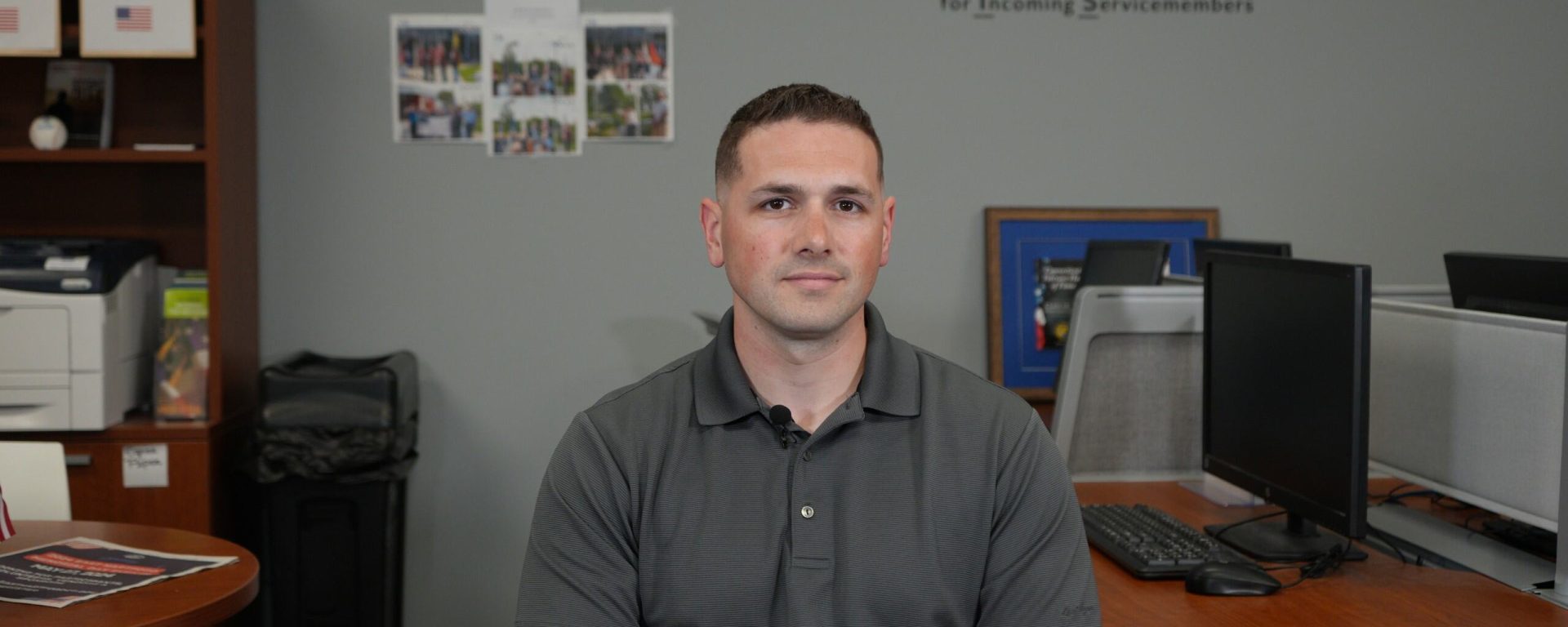Earning a degree in Nursing isn’t only a matter of passing exams and clocking clinical hours — it’s also about developing the compassion, patience, and resilience necessary to navigate challenges in the field.
Likewise, it’s not bravery alone that makes an Army medic. Alongside the courage and commitment it takes to serve, these heroes must command superior healthcare skills and possess an impeccable bedside manner — equipping them to remain calm, empathetic, and focused under high-stakes circumstances.
Nursing student and U.S. veteran Sergeant First Class (SFC) Ryan Will exemplifies these essential qualities. A paramedic, firefighter, and accomplished critical care flight paramedic, Will has embraced every obstacle with remarkable drive and determination, all while balancing his roles as a husband and father of three.
At Goodwin University, SFC. Will has found the exemplary support student veterans deserve, helping him embark on the next step in his professional journey — serving as a critical care flight nurse in the Army.
Finding a future calling
Although born in Southbridge, Massachusetts, Ryan Will was raised a Connecticut native — spending his formative years living a quiet life amidst the rural landscape of Ashford, CT.
As he began his high school career at E.O. Smith, Will was immersed in a welcoming school community. While his social connections were a source of motivation throughout secondary school, Will — like many young people — was uncertain what his professional future would hold.

Taking care to uphold his grades while exploring his passions, Will soon discovered two subjects that lit a fire in him. “I was able to find a path that kept me very interested in maintaining my academic career through the programs offered at my school,” he reflects. “One was health science and the other was an agricultural program through the Future Farmers of America (FFA). I loved both of those programs, and that’s what kept me interested in continuing my educational journey throughout high school.”
From EMT to army medic
Drawn to follow his passion for science and healthcare, Will began working as a Hartford EMT after high school. It was through this channel that the idea to enlist first took form.

“There were a few EMTs I worked with who were either in the Army Reserves or National Guard, and they would always talk about their experiences and stories,” Will recounts. “What they got to do — the excitement, educational opportunities, and benefits — were a huge factor, and that’s what really got me interested. I spent about a year thinking it over and doing some research. Then, I talked to a recruiter and finally decided to take the plunge and enlist as a medic in the Army.”
Ready and resilient
It’s been 14 years since SFC. Will took that plunge. Looking back to basic training, he appreciates it as a transformative process — challenging his perspectives while equipping him to face high-stress situations in the field. “Basic training almost turns your world upside down, especially for me. I grew up in a pretty simple and secluded life. I wouldn’t say I had a ton of hardships early in my life. In basic training, they artificially create that, so it was an eye-opening experience.”
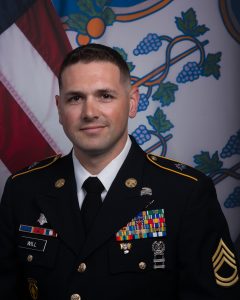
“It’s your first time away from home, family, and friends,” Will continues. “Back when I went through, there was no phone communication. The only way you could contact friends and family was by writing letters, and there would be about a one to two-week lag in between. They put you in a constant state of exhaustion and stress and make you learn how to prioritize and appreciate the necessities in life.”
Despite the rigor of basic training, Will remained persuaded to strive toward professional excellence. “I went on to many trainings over the years, like critical care, paramedic, and flight physiology. All sorts of job-specific classes that help you hone your skills.”
Risk and reward
Will’s training would be taken to the test during two subsequent deployments. “I was deployed from 2018 to 2019 and spent that entire deployment In Syria. Then, I was deployed again from 2023 to 2024 this year. I was a little bit all over the place on that deployment. I spent time in Iraq, Kuwait, and Jordan on the Syrian border.”

During both deployments, Will’s intensive training and expertise as an EMT prepared him to play an essential role: performing life-saving interventions as a critical care flight paramedic. “I operated in a Blackhawk helicopter, and we were pre-positioned at special bases around Iraq and Syria,” he explains. “Our job was to fly and pick up injured persons at the point of injury and hopefully provide life-saving interventions.” He elaborates, “A huge part of that is interfacility transports, where we pick up an injured service member and fly them to a more formal military hospital further away, where they can receive a higher level of care.”
The risky rescue missions and high-stress scenarios faced by critical care flight teams make this career path ill-advised for the faint of heart. For Ryan Will, however, these stressors were balanced by his intrinsic desire to make a positive difference through compassionate care. “The most rewarding aspect of my job was getting feedback that I made an impact on someone’s life and did the right thing,” Will offers. “It could be something as serious as stopping a major hemorrhage or something as simple as holding someone’s hand and calming them down.”
Reaching new heights
Excelling as a flight paramedic, Will was soon encouraged to take his career to the next level. “I was paired with a flight nurse in the back of the helicopter, and we would constantly rely on each other,” he recalls. “They would give pieces of inspiration, tell me about nursing life, culture, and the career path.”
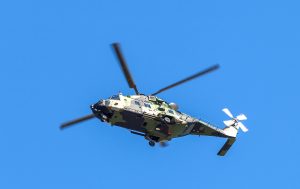
Using the same sound discernment that led him to enlist, Will carefully weighed the possibility of transitioning to the role of a critical care flight nurse — researching and exploring opportunities to begin trekking in this new direction.
His conviction furthered during his most recent deployment when he gained new exposure to advanced opportunities in critical care. “I got to transport patients and turn them directly over to an Air Force team of nurses, doctors, and respiratory therapists,” Will relays. “They fly patients from airfields in Iraq or Kuwait to Germany and then the United States. They care for them the entire time, no matter how sick they are.”
These experiences cemented Will’s track to a career in nursing — proving that becoming a critical care flight nurse would offer the unexplored challenges and elevated opportunities SFC. Will sought.
Did you know Goodwin University is among the top military-friendly colleges in the nation? Located at the heart of our main campus, the Veterans’ OASIS collaborates with faculty and staff throughout the University — providing comprehensive support services tailored to veterans, service members, and their families. Learn more about our Veteran Services today!
Going to Goodwin
Goodwin has a long and well-earned reputation for equipping nurses with the knowledge and skills to achieve professional excellence — a reputation SFC. Ryan Will knew well. “I have a lot of friends who are graduates of Goodwin’s Nursing programs. My wife, Victoire, just graduated from the program here, which is really cool.”
Already possessing close ties to the community, Will knew Goodwin’s quality Nursing curriculum wasn’t the only advantage the University would offer. “I have three children and a full-time career outside of school. Most nursing programs I looked into don’t do well at accommodating adults with families and full-time jobs,” Will delineates. “Goodwin gives you a quality education and all the resources you need but builds the program around working adults with established responsibilities.”
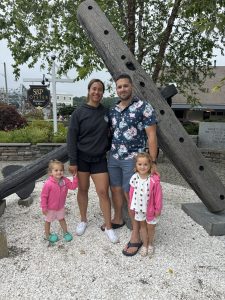
Raising a family, attending school, and working full-time as a firefighter and paramedic means Will is not a stranger to balancing responsibilities. Attending to his priorities with steadfast drive, he channels the skills he honed in the Army. “There’s a fairly significant class and clinical workload, especially in the Nursing program,” he details. “My time in the military helped me prioritize what needs to be done, how to do it in a timely manner, and how not to be stressed about it.”
While his experiences formed a strong foundation for earning his degree, Ryan Will never felt alone in structuring his studies. “The program does a good job of giving you assignments in a digestible manner. It’s a lot of work, but they give it to you at a consistent pace, so you’re not overwhelmed.”
A school for student veterans
Goodwin doesn’t only offer one-of-a-kind flexibility for adult students. A Yellow Ribbon school and top-ranked Military Friendly College, the University takes a unique approach to veteran services.
Although aware that Goodwin’s Yellow Ribbon status meant he could utilize his GI Bill to reduce educational costs, SFC. Ryan Will soon discovered this was just a fraction of the support available to student veterans. “I started learning about more and more resources available to students,” he shares. “One of them is the American Legion program, which is a super helpful partnership for students here. They provide scholarships or grants for student veterans, which helps with a significant part of your fees and tuition.” Will adds, “The University is great about taking other military-sponsored programs, too, such as tuition assistance, which I use every semester.”
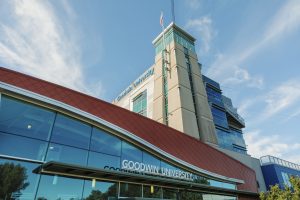
In addition to facilitating financial assistance, Goodwin’s centrally located Veterans’ OASIS offers all-encompassing student support. Unlike most other institutions, the OASIS at Goodwin is a prominent part of Student Services — collaborating with faculty, academic advising, and other departments to support student veterans on their voyage to commencement.
Like his fellow student veterans, SFC. Will found his home base at the OASIS. “We have full-time veterans’ staff that constantly reach out to you. They’re not only making sure you’re getting the resources you need financially and academically, but they’re constantly checking to make sure everything’s okay with your life, family, and work,” he outlines. “It’s a complete approach to support services that’s more than financial. It’s about the student’s well-being and emotional being as well.”
The horizons ahead
With persistence to succeed and Goodwin’s support, Will focuses on earning his degree while keeping an eye on future horizons. “I’d like to graduate from the RN program I’m in now and then do the RN-to-BSN transition program,” he shares. “After getting my BSN, I plan to commission in the Air Force.”
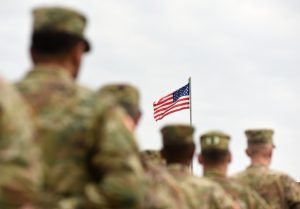
While Will’s goals are tangible, the doors a BSN will open transcend a single career trajectory. “The cool thing about nursing is the endless branches that are available,” he emphasizes. “That’s the magic of nursing. There are so many different sub-specialties and focus areas where you can learn something. You can become competent, master it, and when you’re ready for a transition, you can pick up a whole new sub-specialty. That’s the most exciting part of pursuing this career, knowing it’s not a linear path.”
Recalling the encouragement his compatriots offered, SFC. Ryan Will imparts words of wisdom for other veterans considering college. “First, find the program you want to do, or at least a university that offers multiple programs you’re interested in,” he advises. “But the most important thing to do is to reach out to your veteran services coordinator. They are your absolute lifeline. They’re more than just somebody who helps process veterans’ payments; they’re your guidance counselor, friend, and the resource for finding anything you need.”
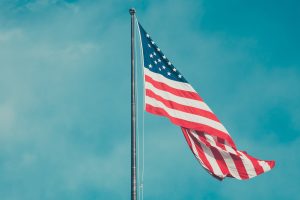
Student veterans are essential to Goodwin’s community, demonstrating distinctive valiance and dedication in the classroom and beyond. The University proudly thanks Sergeant First Class Ryan Will for his committed and compassionate service.
Ready to write your own Goodwin success story? Learn more about joining the GU community today!
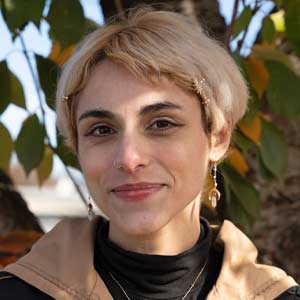
Bri Gagné is a marketing content writer at Goodwin University, bringing backgrounds in literary studies, creative storytelling, Universal Design for Learning (UDL), and social justice. They earned their bachelor’s degree in English Literature and Film Studies from University of Connecticut and a master’s in education from Eastern Connecticut State University.
After teaching English abroad and locally, Bri transitioned to a full-time writing career, contributing to the University’s educational narratives and brand-building efforts. They plan to begin their Master of Fine Arts in creative writing in 2025.

